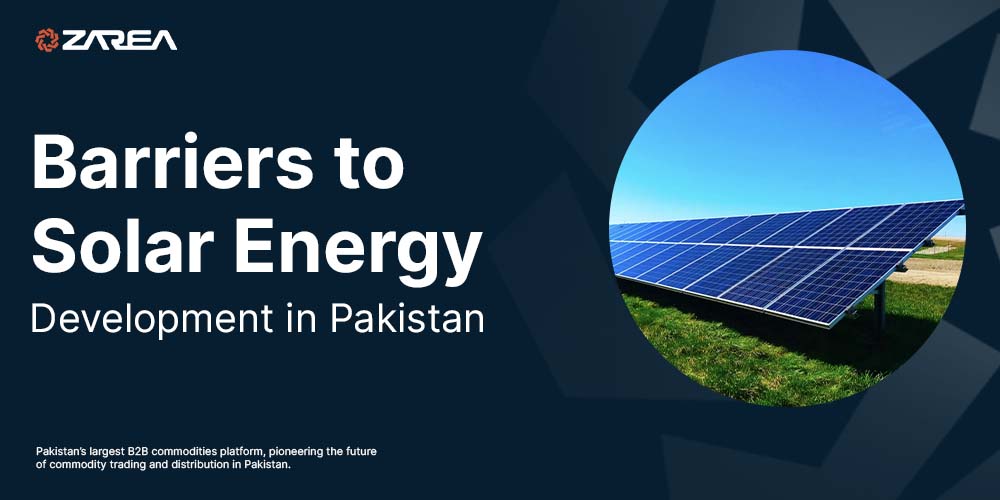Solar energy could revolutionize Pakistan’s energy development sector, driving it towards sustainability and energy independence. Despite the immense potential and need, there are unlimited barriers to solar energy development in Pakistan. Zarea Limited strives to bridge the barriers to solar energy development in Pakistan by providing cost-effective solar products and purchasing finance options for a hassle-free investment in a sustainable future.
Barriers and Challenges to Solar Energy Development in Pakistan
To unlock the potential of solar energy in Pakistan, it is crucial to overcome the following barriers that stand in the way.
Economic Barriers
Transformation towards sustainability comes with a high initial cost. Solar energy development projects entail immense capital upfront with a long period to provide monetary benefits. However, it is an investment one should make to overcome the depletion of non-renewable resources and their cumulative cost. There is a high market potential in the renewable energy sector for solar products but starting a new solar energy project empties the pockets. Moreover, there are numerous uncertainties regarding the performance and efficiency rate of the projects and even government subsidiaries hesitate to let people purchase finance for big projects. Banks, on the other hand, are not willing to give loans as well.
Technical Barriers
The lack of proper local facilities for the production of solar cells and panels and unreliable technology make the promotion of sustainable energy difficult in Pakistan. Unreliable Solar irradiance technology also takes us two steps back. Moreover, the technology needed to manufacture efficient and effective solar energy products is not present, due to which the projects rely on foreign personnel and technology making the production way too expensive.
Regulatory/Policy Barriers
Ambiguous policies and regulations regarding the affiliations of private investors and companies in solar power projects. Weak infrastructure and developing feed-in tariff systems for solar energy production also serve as an obstacle. Additionally, there is no proper structure and regulatory body specifically for renewable energy. There are more incentives and subsidiaries for non-renewable sources than renewable ones. National Energy Efficiency and Conservation Authority (NEECA) is “planning” to initiate the design and development of the Renewable Portfolio Standards (RPS) to reduce the reliance on exhaustible energy resources, but the duration and authorization of the project could take plenty of time.
Research & Development Barriers
Pakistan lacks modern technology, equipment, suppliers, and financers for the maintenance and operation of large-scale energy production projects. Additionally, we lack empirical data on solar irradiance and intensity that can be insightful for the development and planning of solar energy projects in Pakistan.
Social & Information Barriers
Lack of education and motivation about energy consumption, the impact of carbon emission, and the depletion of non-renewable energy resources among the people is another factor that acts as a barrier to solar energy development in Pakistan. Furthermore, Lack of social acceptance and dedication to traditional means of energy production can also be a huge barrier. Communities lack proper knowledge about installation and how to fix and manage solar systems properly.
| Barriers to Solar Energy Development in Pakistan: An Overview | ||||
| Economic | Technical | Regulatory/Policy | R&D and Infrastructure | Social & Information |
|
Lack of capital Budget constraint Risk and high Production cost Limited subsidiaries High investment High payback period |
Lack of technology
Limited Research and Development opportunities Lack of entrepreneurs Quality of equipment |
Lack of administrative initiative
Political instability Uncertain state policy
|
Poor market infrastructure
Small size and developing market Market fluctuation Inaccessibility to raw material |
Lack of public awareness
Resistance to change Lack of high investment |
Conclusion
Renewable energy initiatives have the potential to create a greener world. Countries worldwide are building and planning to integrate sustainable practices into their energy development sectors to maximize production from renewable resources. Though the challenges are uncountable the bigger picture should compel us to embrace renewable and sustainable practices across the globe. Ensuring global energy security is crucial for our survival and must be prioritized. Zarea Limited lends a helpful hand to businesses in investing in solar energy products and overcoming the barriers to solar energy development in Pakistan. Providing the users with the required consultation, and logistics, and Apply for Credit service so they can purchase and invest in sustainable energy products without any hassle.
References
Shahzad, K., Abdul, D., Umar, M., Safi, A., Maqsood, S., Baseer, A., & Lu, B. (2023). Analysis of obstacles to adoption of solar energy in emerging economies using spherical fuzzy AHP decision support system: A case of Pakistan. Energy Reports, 10, 381-395. https://doi.org/10.1016/j.egyr.2023.06.015
































